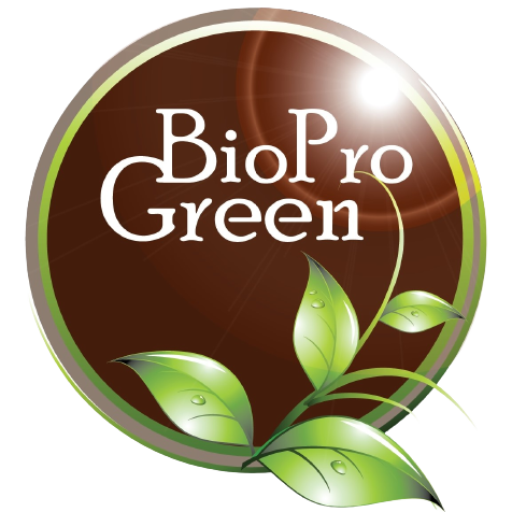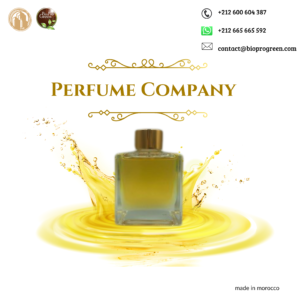
Products-FR
Perfume company

For more informations
Benefits of Perfume Products:
Perfume products offer several benefits to consumers. Firstly, perfumes are widely used to enhance personal experiences and create a sense of pleasure. They not only evoke emotions but also boost confidence and leave a lasting impression. Additionally, wearing a well-suited fragrance can enhance one’s mood and overall well-being. Perfumes allow individuals to express their personality and uniqueness, as each fragrance has its own distinct character that reflects different styles, moods, and preferences. By choosing a perfume that aligns with one’s individuality, individuals can engage in self-expression and personal branding. Moreover, certain perfumes are known for their aromatherapy benefits, uplifting the mood, reducing stress, and promoting relaxation. Aromatherapy-based perfumes utilize specific essential oils to evoke desired emotional responses, ultimately enhancing overall well-being.
Usage of Perfume Products:
Perfume products are used in various ways, offering flexibility to consumers. The most common use of perfumes is to apply them directly to the skin as a personal fragrance. By spraying or dabbing perfume on pulse points like wrists, neck, or behind the ears, individuals can enjoy the fragrance throughout the day. Additionally, perfumes are also used to create pleasant environments within indoor spaces. Through the use of diffusers, scented candles, or room sprays, individuals can infuse their surroundings with captivating fragrances, thereby creating a welcoming and cozy ambiance. Furthermore, perfumes are often integrated into body care products such as lotions, shower gels, and body oils. These scented products provide a comprehensive sensory experience, nourishing the skin while leaving a delicate and long-lasting fragrance.
Marketing and Commercialization of Perfume Products:
Perfume companies employ various marketing strategies to promote and commercialize their products. Firstly, they invest in developing a strong brand identity, which includes distinctive packaging designs. The packaging is carefully crafted to visually represent the brand’s essence and capture consumers’ attention, thus contributing to the overall product experience. Moreover, perfume companies utilize advertising campaigns, social media platforms, and influencer collaborations to raise brand awareness and attract consumers. They often create captivating storytelling around the fragrance, showcasing its unique characteristics and benefits. Additionally, perfume companies employ diverse distribution channels, including brick-and-mortar stores, online platforms, and exclusive boutiques. They work closely with retail partners to ensure the availability of their products in various locations, thereby maximizing consumer reach.
For more informations
FAQ
1) How can I get samples?
To get samples of our products, just contact us and we will be happy to offer you some. For new customers, courier costs will be charged, but samples will be free. In addition, these costs will be deducted from the official order payment. To arrange an RPI (remote pickup) service on FedEx, UPS, DHL, TNT, etc., please contact us and we will help you arrange this.
2) How does your factory perform in terms of quality control?
In our factory, quality is our top priority. We have strict quality controls in place at every stage of the manufacturing process to ensure that all our products are environmentally friendly and meet the highest standards. In addition, all workers are trained to ensure quality control, whether in the stamping, printing, sewing, or packaging process. Finally, our quality control department is specifically responsible for quality control in each process.
3) Can your factory print or emboss my logo on the goods?
We are happy to personalize our products with your logo or other distinctive marks. We can print your logo on the goods or their packaging box, depending on your needs. For patent protection reasons, we usually require a letter of permission for the logo, but we can also produce the goods based on customer samples or on the image, logo, sizes, etc. Contact us for more information on customizing our products.
BioPro Green
N°200 Lot Al Massar, Z.I Sidi Ghanem, Route de Safi, 40 000 Marrakech , MOROCCO
Tel:+212 524 335 449
MOB:+212 600 604 387 (Whatsapp / Viber)
Fax:+212 524 457 961
Website: www.bioprogreen.com
E-mail: contact@www.bioprogreen.com
Contact us
Follow the US:
 http://facebook.com/bioprogreen
http://facebook.com/bioprogreen
 https://www.instagram.com/bioprogreenmorocco
https://www.instagram.com/bioprogreenmorocco
 https://www.youtube.com/@bioprogreenmorocco4708
https://www.youtube.com/@bioprogreenmorocco4708
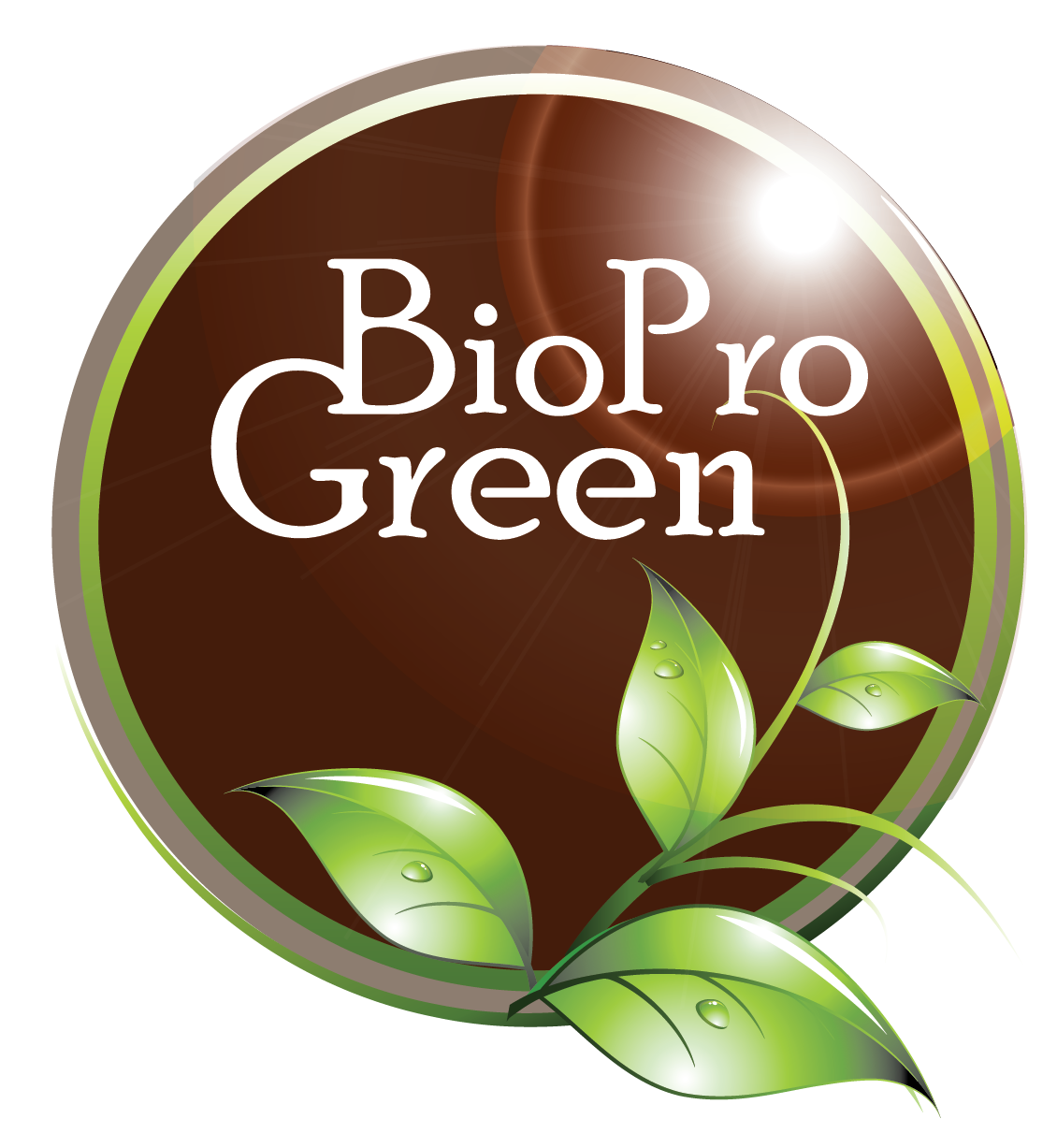
![Perfume]() Parfums Toutparfum Parfum de désert d’orientparfum Parfum de cologneparfum Parfum de Caramelparfum Parfum de crèmeparfum Bois de Oudparfum Parfum fruits rougesparfum Parfum fleur de cotonparfum Parfum de Noix de cocoparfum Parfum de jasmin de damasparfum Parfum de...
Parfums Toutparfum Parfum de désert d’orientparfum Parfum de cologneparfum Parfum de Caramelparfum Parfum de crèmeparfum Bois de Oudparfum Parfum fruits rougesparfum Parfum fleur de cotonparfum Parfum de Noix de cocoparfum Parfum de jasmin de damasparfum Parfum de...

Products-FR
DISCOVER THE SECRET OF TURPENTINE OIL!!!
Welcome to our latest exploration dedicated to turpentine essential oil, a true gem of nature. In this article, we invite you to dive into the enchanting depths of its captivating history, discover its multiple benefits for body and mind, and unveil five ingenious ways to integrate it into your daily life. Get ready to be transported on a revitalizing and inspiring sensory journey!


The History of Turepentine Essential Oil: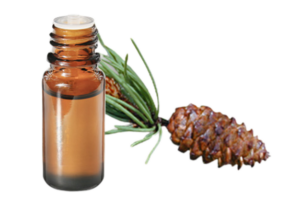
The use of turpentine, the resin from which turpentine essential oil is extracted, dates back to antiquity. The ancient Egyptians, Greeks, and Romans used turpentine for its medicinal and aromatic properties. It was notably used to treat skin conditions, muscle pain, and respiratory problems.
During the Middle Ages, turpentine was a common remedy used in Europe to treat a variety of ailments, ranging from skin infections to respiratory disorders. Its use also spread in the fields of painting and medicine. During the Renaissance, physicians and alchemists studied its properties with renewed interest.
In the 19th century, turpentine essential oil became an essential ingredient in many medical and pharmaceutical products, as well as in the perfume and painting industries. Its use also extended to the manufacturing of varnishes, cleaning products, and solvents.
Today, turpentine essential oil is valued for its many therapeutic applications, including relieving muscle pain, clearing the respiratory tract, and stimulating blood circulation. It is also used in aromatherapy for its invigorating and purifying effects on the mind.
The Top 10 Benefits of Turpentine Essential Oil :
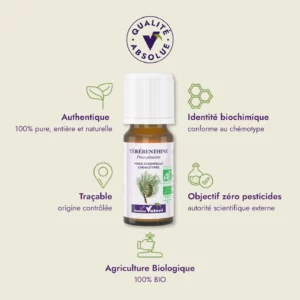
- Antiseptic and antibacterial properties: Turpentine essential oil is known for its powerful antiseptic properties that help disinfect wounds and fight bacterial infections.
- Relief from muscle and joint pain: Thanks to its anti-inflammatory properties, turpentine oil is effective in relieving muscle and joint pain, particularly in cases of rheumatism and arthritis.
- Respiratory decongestant: Inhaled or used in chest massage, turpentine essential oil helps clear the respiratory tract, relieving congestion due to colds or flu.
- Stimulation of blood circulation: By promoting blood circulation, this oil can help reduce the sensation of heavy legs and improve cardiovascular health. Invigorating and toning effect: Its fresh and energizing scent makes it an excellent tonic for the mind, helping to combat mental and physical fatigue and stimulate concentration.
- Air purification: Added to diffusers, turpentine essential oil purifies the surrounding air, eliminating germs and unwanted odors, making it an ideal choice for sanitizing the environment.
- Digestive support: By stimulating the secretion of gastric juices, this oil can help alleviate digestive disorders such as bloating and indigestion.
- Topical use for skin care: Diluted in a carrier oil, turpentine oil can be used to treat skin conditions such as acne, eczema, and fungal infections.
- Natural repellent: Its strong and distinctive smell acts as a natural repellent against insects, particularly mosquitoes and flies.
- Versatility of use: Turpentine essential oil offers a multitude of uses, making it a must-have in any aromatherapy kit.
The 5 Creative Uses of Pine Essential Oil :
-
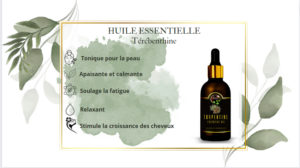
- 1st use: In homemade cleaning products for disinfection and purification.
- 2nd use: In foot care to relieve fatigue and odors.
- 3rd use: In bath bombs for a relaxing and invigorating bath.
- 4th use: In diffusers to purify the air and eliminate bad odors.
- 5th use: In hair care products to stimulate hair growth and eliminate dandruff.
In-depth Information on Pine Essential Oil :
- For a comprehensive understanding, we have included here the technical data sheet of turpentine essential oil, as well as information on its safety and authenticity. These documents ensure its quality and purity, for use with confidence.In traditional medicine, turpentine essential oil is used to treat colds, coughs, bronchitis, rheumatism, and skin infections.
- It is also used in inhalation, massage, or topically applied diluted in a vegetable oil.
BioProGreen Informations
BioProGreen
N°200 Lot Al Massar, Z.I Sidi Ghanem
Safi Road
40 000 Marrakech
MOROCCO
Tel:+212 524 335 449
MOB :+212 600 604 387 (Whatsapp / Viber)
Fax:+212 524 457 961
Website : https://www.bioprogreen.com/
Email : contact@www.bioprogreen.com
Follow US:
https://www.facebook.com/bioprogreenMorocco
https://www.instagram.com/bioprogreenmorocco
https://www.youtube.com/@bioprogreenmorocco4708
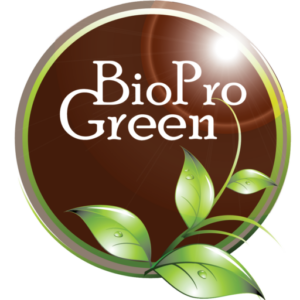
Informations supplémentaires :
Click here to download :Technical data sheet
Click here to download : Safety data sheet
Click here to download :Certificate of analysis
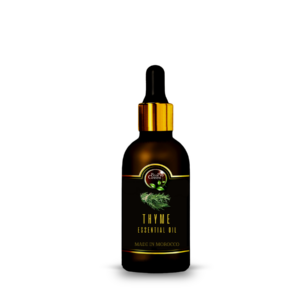
Products-FR

Bienvenue sur le blog de Bio Pro Green, où nous sommes fiers de vous présenter un de nos trésors de la nature : l’huile de thym. Avec son histoire, ses biens faits et comment l’utiliser Découvrez notre huile de thym Bio Pro Green, parfaite pour l’aromathérapie et les soins de la peau. Riche en thymol, elle booste les défenses naturelles et revitalise le corps. Un incontournable pour un bien-être naturel au quotidien

L’HISTOIRE DE L’HUILE ESSENTIEL DE THYM
L’huile de thym, extraite de la plante de thym (Thymus vulgaris), possède une histoire riche
et ancienne qui remonte à des millénaires. Originaire des régions méditerranéennes, cette
plante était déjà utilisée dans les civilisations égyptienne et grecque pour ses vertus
médicinales, culinaires et même dans les rites funéraires, où elle servait à embaumer.
Au Moyen Âge, le thym était prisé pour ses propriétés antiseptiques. On l’utilisait pour
soigner les blessures de champ de bataille et pour combattre la peste. Les dames de
l’époque portaient souvent du thym dans des sachets pour bénéficier de son parfum et de ses supposées propriétés protectrices. Chez les Grecs anciens, le thym était symbole de courage et de force. Ils l’utilisaient dans
leurs bains et brûlaient ses feuilles comme encens dans les temples pour purifier
l’atmosphère. Les Romains, quant à eux, l’employaient pour purifier leurs maisons et
ajoutaient l’herbe à leurs aliments pour leur conférer arôme et vertus digestives.
La distillation de l’huile de thym a commencé à être documentée au cours du XVIe siècle,
bien que les méthodes d’extraction aient pu être connues bien avant. Cette huile
essentielle a été valorisée pour son efficacité dans le traitement des infections
respiratoires, des problèmes digestifs et comme remède contre divers maux, notamment
le rhume et la toux.
Aujourd’hui, l’huile de thym est largement reconnue et utilisée en aromathérapie pour ses
effets bénéfiques sur l’esprit et le corps, ainsi que dans le domaine de la cosmétique pour
ses propriétés antibactériennes et son parfum vivifiant. Son usage continue d’évoluer,
mais le lien entre le thym et la recherche du bien-être reste aussi fort que dans l’antiquité
LES BIENS FAITS DE L’HUILE DE THYM
1.Propriétés antibactériennes : L’huile de thym est efficace contre diverses bactéries et
champignons, ce qui en fait un excellent désinfectant naturel.
2.Renforcement du système immunitaire : Riche en vitamine C, l’huile de thym aide à
renforcer le système immunitaire et à combattre les infections.
3.Soulagement des problèmes respiratoires : Elle est souvent utilisée pour soulager les
symptômes de bronchite, de sinusite et d’autres affections respiratoires grâce à ses
propriétés expectorantes.
4.Amélioration de la digestion : L’huile de thym peut aider à réduire les gaz, la distension
abdominale et favoriser une digestion saine.
5.Propriétés anti-inflammatoires : Elle aide à réduire l’inflammation, ce qui peut être
bénéfique pour les personnes souffrant d’arthrite ou d’autres inflammations chroniques
6.Soutien à la santé de la peau : Avec ses propriétés antibactériennes et antifongiques,
l’huile de thym est utilisée pour traiter les problèmes de peau tels que l’acné, les
éruptions cutanées et les infections fongiques.
 7.Propriétés antioxydantes : L’huile de thym contient des antioxydants qui aident à
7.Propriétés antioxydantes : L’huile de thym contient des antioxydants qui aident à
combattre les radicaux libres et à protéger contre le vieillissement cellulaire
8.Amélioration de l’humeur : L’inhalation de l’huile de thym peut avoir un effet positif sur
l’humeur et aider à réduire le stress et l’anxiété.
9.Santé bucco-dentaire : Utilisée dans les bains de bouche et les dentifrices, l’huile de
thym aide à combattre les bactéries buccales et à prévenir les problèmes dentaires
comme les caries.
10.Soutien à la santé des cheveux : Elle peut être utilisée pour traiter le cuir chevelu,
combattre les pellicules et renforcer les racines des cheveux.
COMMENT UTILISER L’HUILE DE THYM ?
Diffusion : Utilisez un diffuseur pour disperser l’huile de thym dans l’air. Cela peut aider à purifier
l’air, à améliorer l’humeur et à soulager les problèmes respiratoires. Quelques gouttes suffisent
généralement pour un usage domestique.
– Application topique : Pour utiliser l’huile de thym sur la peau, il est essentiel de la diluer avec une
huile porteuse (comme l’huile d’amande douce ou de coco) pour éviter l’irritation cutanée.
Appliquez le mélange sur les zones concernées pour traiter des affections telles que l’acné, les
infections fongiques ou les douleurs musculaires et articulaires. Ratio recommandé : 1 à 2 gouttes
d’huile de thym pour environ une cuillère à soupe d’huile porteuse.
– Inhalation : Pour soulager les symptômes de congestion ou de problèmes respiratoires, ajoutez
quelques gouttes d’huile de thym à un bol d’eau chaude et inhalez la vapeur. Cette méthode peut
aider à dégager les voies respiratoires.
– Usage oral : L’huile de thym peut être utilisée pour la santé bucco-dentaire, mais elle doit être
utilisée avec prudence. Ajoutez une goutte à votre dentifrice ou rincez-vous la bouche avec une
solution diluée (une goutte d’huile pour un verre d’eau) pour aider à combattre les bactéries et
rafraîchir l’haleine.
– Bain : Ajouter quelques gouttes d’huile de thym diluée à l’eau du bain peut aider à soulager les
douleurs musculaires et à promouvoir la relaxation
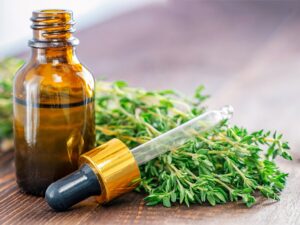
LES INFORMATIONS SUR LE STOCKAGE DU PRODUIT
Il existe quelques conditions de stockage à respecter pour l’huile de thym voici quelques unes :
1) À l’abri de la lumière : Stockez l’huile de thym dans un contenant foncé ou
opaque pour la protéger de la lumière, qui peut dégrader ses composés actifs.
2) Dans un endroit frais et sec : Évitez de stocker l’huile de thym dans des
endroits chauds ou humides. Une température ambiante ou légèrement plus
fraîche est idéale.
3) Hors de portée des enfants : Comme avec toutes les huiles essentielles,
gardez l’huile de thym hors de portée des enfants pour éviter toute
ingestion accidentelle ou mauvaise utilisation.
4) Bien fermé : Assurez-vous que le contenant de l’huile est toujours bien
fermé après utilisation pour éviter l’évaporation des composés volatils et
l’entrée d’air qui peut oxyder l’huile.
5) Éviter les contenants en plastique : Préférez les contenants en verre,
notamment ceux de couleur ambre ou bleue, car le plastique peut interagir
avec les huiles essentielles au fil du temps.

LA SECURITE
– Dilution : Toujours diluer l’huile de thym avant l’application cutanée pour
minimiser les risques d’irritation.
– Utilisation limitée : Éviter une utilisation excessive, en particulier sur de
grandes surfaces de la peau ou pendant une longue période.
– Consultation médicale : Demander conseil à un professionnel de la santé
avant d’utiliser l’huile de thym, surtout si vous avez des conditions médicales
préexistantes ou si vous prenez des médicaments
LES INGREDIENTS A CONNAITRE AVANT D'UTILISER L'HUILE DE THYM
1. Thymol : C’est le principal composant actif de l’huile de thym. Le thymol est un
puissant antiseptique, mais il peut être très irritant pour la peau et les muqueuses.
En concentration élevée, il peut causer des réactions cutanées sévères et même des
brûlures.
2. Carvacrol : Similaire au thymol, le carvacrol est un autre composé phénolique
présent dans l’huile de thym. Il possède des propriétés antibactériennes et
antifongiques fortes, mais peut également être irritant pour la peau et les voies
respiratoires en cas d’exposition excessive.
3. Cymène : Ce composé peut contribuer à l’irritation cutanée et respiratoire. Il est
aussi suspecté d’être un perturbateur endocrinien potentiel.
4. Linalool : Bien qu’il soit moins irritant que les autres composés, le linalool, présent
dans de nombreuses huiles essentielles, peut causer des réactions allergiques chez
certaines personnes, en particulier après une exposition prolongée ou répétée.



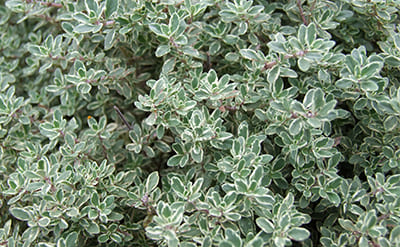
L’huile de thym de Bio Pro Green offre une multitude de bienfaits pour la santé grâce
à ses propriétés antiseptiques, anti-inflammatoires et stimulantes. Optez pour cette
huile de qualité, issue de l’agriculture biologique, pour renforcer votre système
immunitaire, soulager les maux de gorge et les douleurs articulaires, tout en
préservant votre bien-être et celui de l’environnement.
BioProGreen Information
BioProGreen
N°200 Lot Al Massar, Z.I Sidi Ghanem
Safi Road
40 000 Marrakech
MOROCCO
Tel:+212 524 335 449
MOB :+212 600 604 387 (Whatsapp / Viber)
Fax:+212 524 457 961
Website : https://www.bioprogreen.com/
Email : contact@www.bioprogreen.com
Follow US:
https://www.facebook.com/bioprogreenMorocco
https://www.instagram.com/bioprogreenmorocco
https://www.youtube.com/@bioprogreenmorocco4708

CLIQUEZ ICI POUR TELECHARGER LA FICHE DE DONNEE DE SECURITE.PDF
CLIQUEZ ICI POUR TELECHARGER LE CERTIFICAT D’ANALYSE.PDF
CLIQUEZ ICI POUR TELECHARGER LA FICHE TECHNIQUE DU PRODUIT.PDF

Products-FR
The essence of well-being, Pro Green Organic Thyme Oil

Welcome to the Bio Pro Green blog, where we are proud to introduce one of nature’s treasures: thyme oil. Discover the history, benefits, and uses of our Pro Green Organic Thyme Oil, perfect for aromatherapy and skin care. Rich in thymol, it boosts natural defenses and revitalizes the body. A must-have for natural well-being on a daily basis.
the history of thyme essential oil
 Thyme oil, extracted from the thyme plant (Thymus vulgaris), has a rich and ancient history dating back thousands of years. Originating from Mediterranean regions, this plant was already used in Egyptian and Greek civilizations for its medicinal, culinary properties, and even in funeral rites, where it was used for embalming. In the Middle Ages, thyme was valued for its antiseptic properties. It was used to treat battlefield wounds and to combat the plague. Ladies of the time often carried thyme in sachets to benefit from its fragrance and supposed protective properties. In ancient Greece, thyme was a symbol of courage and strength. It was used in their baths and burned as incense in temples to purify the atmosphere. The Romans used it to purify their homes and added the herb to their food to impart aroma and digestive virtues. The distillation of thyme oil began to be documented in the 16th century, although extraction methods may have been known much earlier. This essential oil was valued for its effectiveness in treating respiratory infections, digestive problems, and as a remedy for various ailments, including colds and coughs. Today, thyme oil is widely recognized and used in aromatherapy for its beneficial effects on the mind and body, as well as in the cosmetic field for its antibacterial properties and invigorating scent. Its use continues to evolve, but the link between thyme and the pursuit of well-being remains as strong as in antiquity
Thyme oil, extracted from the thyme plant (Thymus vulgaris), has a rich and ancient history dating back thousands of years. Originating from Mediterranean regions, this plant was already used in Egyptian and Greek civilizations for its medicinal, culinary properties, and even in funeral rites, where it was used for embalming. In the Middle Ages, thyme was valued for its antiseptic properties. It was used to treat battlefield wounds and to combat the plague. Ladies of the time often carried thyme in sachets to benefit from its fragrance and supposed protective properties. In ancient Greece, thyme was a symbol of courage and strength. It was used in their baths and burned as incense in temples to purify the atmosphere. The Romans used it to purify their homes and added the herb to their food to impart aroma and digestive virtues. The distillation of thyme oil began to be documented in the 16th century, although extraction methods may have been known much earlier. This essential oil was valued for its effectiveness in treating respiratory infections, digestive problems, and as a remedy for various ailments, including colds and coughs. Today, thyme oil is widely recognized and used in aromatherapy for its beneficial effects on the mind and body, as well as in the cosmetic field for its antibacterial properties and invigorating scent. Its use continues to evolve, but the link between thyme and the pursuit of well-being remains as strong as in antiquity
THE BENEFITS OF THYME OIL
1.Antibacterial properties: Thyme oil is effective against various bacteria and fungi, making it an excellent natural disinfectant
2.Immune system boost: Rich in vitamin C, thyme oil helps strengthen the immune system and fight infections.
3.Respiratory relief: It is often used to relieve symptoms of bronchitis, sinusitis, and other respiratory conditions due to its expectorant properties.
4.Digestive improvement: Thyme oil can help reduce gas, bloating, and promote healthy digestion

5.Anti-inflammatory properties: It helps reduce inflammation, which can be beneficial for people suffering from arthritis or other chronic inflammations.
6.Skin health support: With its antibacterial and antifungal properties, thyme oil is used to treat skin problems such as acne, rashes, and fungal infections.
7.Antioxidant properties: Thyme oil contains antioxidants that help fight free radicals and protect against cellular aging.
8.Mood enhancement: Inhalation of thyme oil can have a positive effect on mood and help reduce stress and anxiety.
9.Oral health: Used in mouthwashes and toothpaste, thyme oil helps fight oral bacteria and prevent dental problems like cavities.
10.Hair health support: It can be used to treat the scalp, fight dandruff, and strengthen hair roots.
HOW TO USE THYME OIL?
Diffusion: Use a diffuser to disperse thyme oil into the air. This can help purify the air, improve mood, and relieve respiratory issues. A few drops are usually sufficient for home use.
Topical application: To use thyme oil on the skin, it is essential to dilute it with a carrier oil (such as sweet almond or coconut oil) to avoid skin irritation. Apply the mixture to the affected areas to treat conditions such as acne, fungal infections, or muscle and joint pain. Recommended ratio: 1 to 2 drops of thyme oil for about a tablespoon of carrier oil.
Inhalation: To relieve symptoms of congestion or respiratory problems, add a few drops of thyme oil to a bowl of hot water and inhale the steam. This method can help clear the airways.
Oral use: Thyme oil can be used for oral health but should be used cautiously. Add a drop to your toothpaste or rinse your mouth with a diluted solution (one drop of oil to a glass of water) to help fight bacteria and freshen breath.
Bath: Adding a few drops of diluted thyme oil to bath water can help relieve muscle pain and promote relaxation.

There are some storage conditions to follow for thyme oil, here are some:
1) Away from light: Store thyme oil in a dark or opaque container to protect it from light, which can degrade its active compounds.
2)In a cool, dry place: Avoid storing thyme oil in hot or humid areas. Room temperature or slightly cooler is ideal.
3)Out of reach of children: As with all essential oils, keep thyme oil out of reach of children to prevent accidental ingestion or misuse.
4)Tightly closed: Ensure that the oil container is always tightly closed after use to prevent the evaporation of volatile compounds and the entry of air that can oxidize the oil.
5)Avoid plastic containers: Prefer glass containers, especially those in amber or blue, as plastic can interact with essential oils over time.

SAFETY
Dilution: Always dilute thyme oil before skin application to minimize the risk of irritation.
Limited use: Avoid excessive use, especially over large areas of the skin or for an extended period.
- Medical consultation: Seek advice from a healthcare professional before using thyme oil, especially if you have pre-existing medical conditions or are taking medication.
THE INGREDIENTS TO KNOW BEFORE USING THYME OIL
1. Thymol: This is the main active component of thyme oil. Thymol is a powerful antiseptic, but it can be very irritating to the skin and mucous membranes. At high concentrations, it can cause severe skin reactions and even burns.
2. Carvacrol: Similar to thymol, carvacrol is another phenolic compound found in thyme oil. It has strong antibacterial and antifungal properties, but can also be irritating to the skin and respiratory tract in cases of excessive exposure.3
3. Cymene: This compound can contribute to skin and respiratory irritation. It is also suspected to be a potential endocrine disruptor.
4. Linalool: Although less irritating than other compounds, linalool, found in many essential oils, can cause allergic reactions in some people, especially after prolonged or repeated exposure.




BioProGreen Information
BioProGreen
N°200 Lot Al Massar, Z.I Sidi Ghanem
Safi Road
40 000 Marrakech
MOROCCO
Tel:+212 524 335 449
MOB :+212 600 604 387 (Whatsapp / Viber)
Fax:+212 524 457 961
Website : https://www.bioprogreen.com/
Email : contact@www.bioprogreen.com
Follow US:
https://www.facebook.com/bioprogreenMorocco
https://www.instagram.com/bioprogreenmorocco
https://www.youtube.com/@bioprogreenmorocco4708

click here to download the product data sheet.pdf
click here to download the certificate of analysis for thyme oil.pdf
click here to download the safety data sheet


![]() http://facebook.com/bioprogreen
http://facebook.com/bioprogreen![]() https://www.instagram.com/bioprogreenmorocco
https://www.instagram.com/bioprogreenmorocco![]() https://www.youtube.com/@bioprogreenmorocco4708
https://www.youtube.com/@bioprogreenmorocco4708
